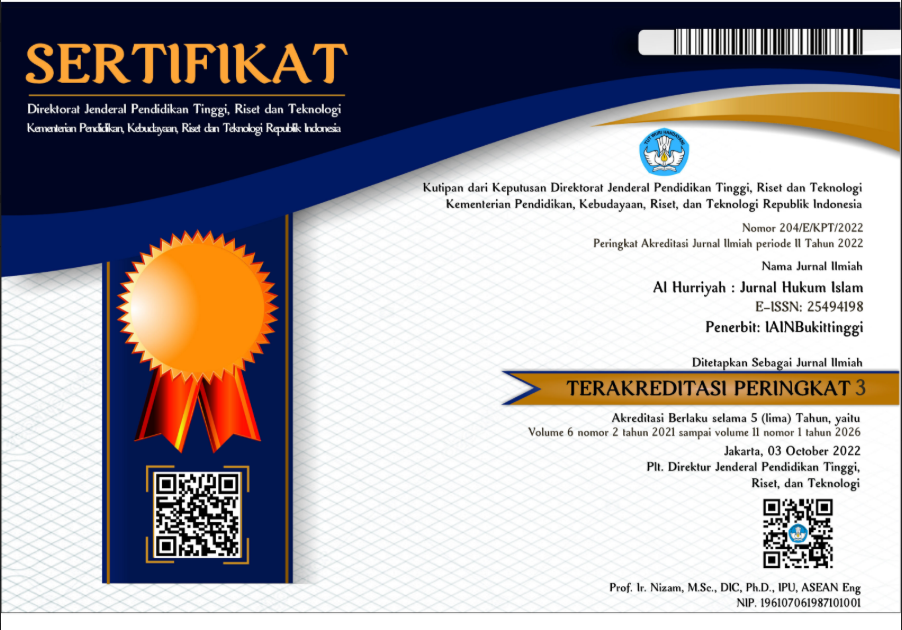KONSEP RIBA DALAM KOMPILASI HUKUM EKONOMI SYARI’AH (Studi Analisis Teks Kompilasi Hukum Ekonomi Syari;ah Indonesia)
DOI:
https://doi.org/10.30983/alhurriyah.v3i2.718Abstract
Economic and financial issues such as trade (tijarah), rent (ijarah), mortgage (rahn), accounts payable (mudayanah), wages to pay (ujrah) and others related to the basic norms of economic transactions are arranged all in Islam . Allah has reduced sustenance to this world to be used by humans in a way that has been legalized by Allah SWT and is clean of all acts that contain usury. Usury is an additional requirement in a business transaction without the existence of iwadh (equivalent) which is justified by the shari'ah for the addition. Broadly speaking, usury is classified into two; usury of debt and usury debt buying and selling. Usury debt accounts are divided into two, namely; usury qiradh and usury jahiliyah, while usury selling and buying is also divided into two, namely usury fadhal and riba nasi'ah. The rules relating to usury are also widely discussed by the jurists in their books. KHES is the actual form of Islamic law in Indonesia related to Islamic economic activities. So that with the presence of KHES, economic business actors carried out according to shari'ah principles if a dispute occurs, it can be resolved with this KHES reference. KHES has been used as a guideline that replaces Islamic law, namely the Qur'an and hadith. KHES is a syari'ah principle guideline source for Judges in the Religious Court and also for the Syari'ah Arbitration Agency in terms of resolving sharia economic disputes. The problem is that none of the KHES articles deal with usury. The word "usury" is only a few that can be found in this book of KHES. This is due, among others; First, KHES discusses the contracts in mu'amalah. While usury is not a contract. Second, KHES adopts some of the books of Majallah al Ahkam al ‘Adliyyah of the Ottoman Turks so also there is no discussion regarding usury or interest. Third, avoiding usury is the principle of transactions / contracts in the Shari'ah. The position of usury is parallel with gharar, maisir and dharar which must also be avoided. Fourth, that in the treasury of Islamic law or fiqh it has been discussed / discussed in depth and wide, so that it is felt that there is no need to be raised (specifically discussed) in KHES.
References
Muhammad bin Ismail Al-Amir Ash-Shan’ani, Subulus Salam Syarah Bulughul Maram, penerj. Muhammad Isnan, dkk, Jakarta: Darus Sunnah Press, 2012, cet. ke-7
Ahmad Sarwat, Kitab Mu’amalat, [t.tp]: Kampus Syari’ah, 2009).
Abdul Rahman Ghazaly, dkk, Fiqh Mu’amalat, Jakarta: Kencana Prenada Media Group, 2012, cet. Ke-2
Zainuddin Ali, Hukum Ekonomi Syari’ah, Jakarta: Sinar Grafika, 2008
PPHIMM, Kompilasi Hukum Ekonomi Syari’ah, Jakarta: Kencana Prenada Media Group, 2009
Abd. Shomad, Hukum Islam: Penormaan Prinsip Syari’ah dalam Hukum Indonesia Edisi Revisi, Jakarta: Kencana Prenada Media Group, 2012
Zainuddin Ali, Hukum Perbankan Syari’ah, Jakarta: Sinar Grafika, 2010
Abu Sura’i Abdul Hadi, Bunga Bank dalam Islam terjemahan dari Ar Riba wal Qurudl, Surabaya: Al Ikhlas, 1993
Muhammad bin Ismail al Amir ash Shan’ani, Subul al-Salam Syarah Bulughul Maram, penerj. Muhammad Isnan, dkk, Jakarta: Darus Sunnah Press, 2012
Dwi Suwiknyo, Kompilasi Tafsir Ayat-Ayat Ekonomi Islam, Yogyakarta: Pustaka Pelajar, 2010
Ascarya, Akad & Produk Bank Syari’ah,Jakarta: PT. Raja Grafindo Persada, 2008
Rachmat Syafe’I, Fiqih Muamalah, Bandung: CV. Pustaka Setia, 2001
Muhammad Muslehuddin, Sistem Perbankan dalam Islam, Jakarta: PT. Rineka Cipta, 2004
Muhammad Sharif Chaudry, Sistem Ekonomi Islam: Prinsip Dasar terjemahan Fundamental of Islamic Economic System, Jakarta: Kencana Prenada Media Group, 2012
Departemen Pendidikan Nasional, Kamus Besar Bahasa Indonesia, Jakarta: Balai Pustaka, 2002
Pratiwi dan Ahmad Rifai, Urgensi Pembentukan Kitab Undang-Undang Hukum Ekonomi Syariah Indonesia, Jurnal Syariah 4 Juli 2016
Zainuddin Ali, Hukum Ekonomi Syari’ah, Jakarta: Sinar Grafika, 2008
PPHIMM, Kompilasi Hukum Ekonomi Syari’ah (Edisi Revisi), Jakarta: Kencana, 2009
Kompilasi Hukum Ekonomi Syari’ah.
Drs. H. Edi Riadi, SH, MH, Wawancara Pribadi via telepon pada 23-3-2018.
Zulkarnain Abdurrahman, Keberadaan Majallat al Ahkam al ‘Adliyah dalam Perkembangan Hukum Islam, http: pmi.uinsu.ac.id/berita/read/132/keberadaan-majallat-al-ahkam-al-adliyah-dalam-perkembangan-hukum-islam.html diakses pada Senin 16 Juli 2018.
Dr. H. Anton Athoillah, MM, Wawancara Pribadi , via Whatsapp pada 15-7-2018
Prof. Dr. Jaih Mubarok, M. Ag, Wawancara Pribadi , via Whatsapp pada 17-7-2018.
Bapak Drs. H. Farid Ismail, SH, MH, Wawancara Pribadi, via Facebook.
Downloads
Published
How to Cite
Issue
Section
Citation Check
License
Authors who publish with this journal agree to the following terms:
- Authors retain copyright and grant the journal right of first publication with the work simultaneously licensed under a Creative Commons Attribution-ShareAlike 4.0 International License that allows others to share the work with an acknowledgment of the work's authorship and initial publication in this journal.
- Authors are able to enter into separate, additional contractual arrangements for the non-exclusive distribution of the journal's published version of the work (e.g., post it to an institutional repository or publish it in a book), with an acknowledgment of its initial publication in this journal.
- Authors are permitted and encouraged to post their work online (e.g., in institutional repositories or on their website) prior to and during the submission process, as it can lead to productive exchanges, as well as earlier and greater citation of published work (See The Effect of Open Access).





